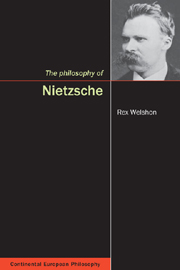6 - Logic and epistemology
Summary
Logic studies reasoning and epistemology studies knowledge. The two are obviously linked: being justified in believing something, a topic of epistemology, presupposes for most beliefs that we are reasoning well about the subject of the belief, a topic of logic. Yet logic is a more abstract undertaking than epistemology, for its subject is reasoning in every field of knowledge, whether mathematics, physics or theology. Logic is concerned with, among others, the following questions: what makes a valid deductive argument valid? What makes it sound? What is the difference between the syntax of a language and its semantics? Are there options for syntax and semantics? If so, what are they? Epistemology is concerned with, among others, the following questions: how much do we know? What is it that we know when we know? What are we doing when we know something? How do we know what we know? Nietzsche has interesting things to say about all these questions.
Nietzsche is anything but a fanatical supporter of logic or the traditional epistemological project. The Nachlass contains numerous passages asserting the ineliminable falsifications produced by logic. For example, he notes in one passage that “the will to logical truth can be carried through only after a fundamental falsification of all events is assumed … logic does not spring from will to truth” (WP 512), and, again, “Logic (like geometry and arithmetic) applies only to fictitious entities that we have created.
Information
- Type
- Chapter
- Information
- The Philosophy of Nietzsche , pp. 115 - 134Publisher: Acumen PublishingPrint publication year: 2004
